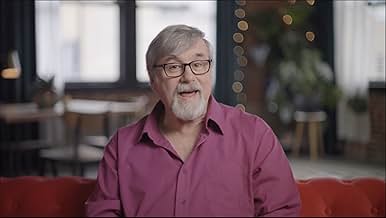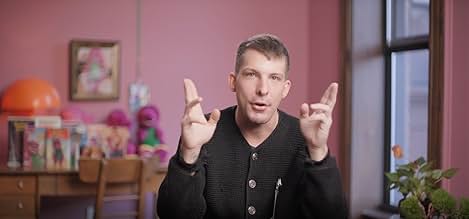Barney el dinosaurio, expone la necesidad humana de odiar. Y nos preguntamos: ¿Se ha quebrado algo en la sociedad estadounidense?, o ¿siempre ha sido así?Barney el dinosaurio, expone la necesidad humana de odiar. Y nos preguntamos: ¿Se ha quebrado algo en la sociedad estadounidense?, o ¿siempre ha sido así?Barney el dinosaurio, expone la necesidad humana de odiar. Y nos preguntamos: ¿Se ha quebrado algo en la sociedad estadounidense?, o ¿siempre ha sido así?
Explorar episodios
Opiniones destacadas
Upon viewing the first episode , I found my self in tears. Being born in 1999, Barney was the show that I was stuck to as early as I can remember . The guest speakers were a very pleasant surprise and added great composition to the series. I do however wish that the series could have been longer and included more flashback from the series and behind the scenes intel. Also, the series could have touched on the role that early YouTube played into this barney hating phenomenon. This series was created exactly for its targeted audience and succeeded in the raw feelings of nostalgia and childhood!!
I used to like Barney when I was younger, but I'm now neutral to it. However, I agree or used to agree with some of the criticisms it commonly receives and used to make fun of some of them (e.g., Barney's voice sounding dopey, some of the songs being annoying, the series being set in a perfect world, etc. I still hate these aspects, minus the setting being "perfect"). I'm also aware that there's a Wikipedia page for anti-Barney humor. I decided to watch I Love You, You Hate Me because I was intrigued when I read about it in an article and saw the trailer, and I have to admit that it was a good documentary! There are people from media that I like who are involved in this, like Steve Burns from Blue's Clues, Bill Nye the Science Guy, and a few others. I was already neutral to Barney before watching the doc, but I've warmed up to Barney a little more because of it.
After learning more about Barney from the doc, it's clear that some people take the popular children's character too seriously. Barney the purple dinosaur is known for loving and accepting everyone for who they are, and I don't understand how anyone could go wrong with that. Friendship and acceptance are essential themes of the show. A couple of the child (now adult) actors from the first three seasons of Barney shared experiences of racism before it came along, and they found acceptance and appreciation during their time on the show. However, after leaving the show and going back to school, they faced bullying from their peers for their involvement with Barney and struggled with coping mechanisms such as smoking and drinking. It's heartwarming that they found acceptance on the show, but it's sad to hear about the challenges they faced before and afterward.
Unfortunately, there have been instances of bullying and mistreatment directed at Barney's fans and the show's cast and crew, including death threats via emails and name-calling. It's disheartening to hear that some individuals have targeted Barney fans and the show's personnel with harassment, threats, and destructive behavior. This behavior does not align with Barney's core values, which include love, inclusion, and acceptance. It's important to remember that everyone is entitled to their own opinions, and it's okay if someone doesn't like Barney. However, it's essential to treat others with respect and consideration and to acknowledge the positive impact the show has had on many individuals, regardless of differing preferences.
The documentary also talks about the negative reception Barney received when it first aired in the 1990s. Some people criticized the show for not being edgy, reflecting a cultural tendency toward cynicism at the time. It's noted that the rise of the internet during that era also contributed to the backlash the show faced. It's worth remembering that just because something isn't considered edgy doesn't mean it sucks. If every show/movie were edgy, the TV/movie industry would be boring and unoriginal. If people had given Barney a chance, they might have liked it.
The text also draws a parallel between the criticism faced by Barney and what Sesame Street might have experienced if the internet existed during its early years. It's acknowledged that some people might not like Barney, and that's okay.
Barney's head writer, Steve White, emphasized that the show aimed to inspire viewers to make the world a better place and never tried to argue that the world was a perfect place. There are several episodes where the characters face challenges and conflicts, even ones from before the Hit Entertainment era (more about that in a little bit), such as Baby Bop getting a stomachache after eating too many cookies, the kids getting scared of a grizzly bear, the characters losing a Christmas star, Barney and the kids trying to help BJ and Baby Bop settle an argument, and more. Additionally, Hit Entertainment created more episodes with conflict-based plots in response to feedback about the show's setting when they acquired the rights to it. The characters are indeed happy most of the time, but why shouldn't they be? What do you expect them to do? Mope around like a bunch of goths? Also, these items made me realize that the criticisms about the perfect setting were somewhat invalid. Despite differing opinions, many people appreciate the valuable life lessons imparted by Barney, even if they don't particularly enjoy the show itself.
Steve Burns asked the rest of the crew, "Who was your Barney growing up, and how would you feel about a room full of people hating on him/her?" Their "Barneys" included their teddy bears, Elmo, Bert and Ernie, Big Bird, and numerous other characters and toys, and they didn't like the idea of a room full of people hating on them. I must say that they hit the nail on the head with those lines! Even though I grew up with Barney, I think it'd be more accurate to say that my "Barney" was either Charlie Brown, Winnie the Pooh, Mickey Mouse, SpongeBob, Elmo, or all of the above, and I REALLY wouldn't want to be in a room full of people hating on either of them. You probably wouldn't like the idea of a room full of people bashing your favorite toy(s) or character(s) either.
In conclusion, whether you love or hate Barney, "I Love You, You Hate Me" offers a fresh perspective that may change your feelings about the character and show. Even if you're a Barney fan, this documentary is worth watching to gain a deeper understanding of the public's perception.
After learning more about Barney from the doc, it's clear that some people take the popular children's character too seriously. Barney the purple dinosaur is known for loving and accepting everyone for who they are, and I don't understand how anyone could go wrong with that. Friendship and acceptance are essential themes of the show. A couple of the child (now adult) actors from the first three seasons of Barney shared experiences of racism before it came along, and they found acceptance and appreciation during their time on the show. However, after leaving the show and going back to school, they faced bullying from their peers for their involvement with Barney and struggled with coping mechanisms such as smoking and drinking. It's heartwarming that they found acceptance on the show, but it's sad to hear about the challenges they faced before and afterward.
Unfortunately, there have been instances of bullying and mistreatment directed at Barney's fans and the show's cast and crew, including death threats via emails and name-calling. It's disheartening to hear that some individuals have targeted Barney fans and the show's personnel with harassment, threats, and destructive behavior. This behavior does not align with Barney's core values, which include love, inclusion, and acceptance. It's important to remember that everyone is entitled to their own opinions, and it's okay if someone doesn't like Barney. However, it's essential to treat others with respect and consideration and to acknowledge the positive impact the show has had on many individuals, regardless of differing preferences.
The documentary also talks about the negative reception Barney received when it first aired in the 1990s. Some people criticized the show for not being edgy, reflecting a cultural tendency toward cynicism at the time. It's noted that the rise of the internet during that era also contributed to the backlash the show faced. It's worth remembering that just because something isn't considered edgy doesn't mean it sucks. If every show/movie were edgy, the TV/movie industry would be boring and unoriginal. If people had given Barney a chance, they might have liked it.
The text also draws a parallel between the criticism faced by Barney and what Sesame Street might have experienced if the internet existed during its early years. It's acknowledged that some people might not like Barney, and that's okay.
Barney's head writer, Steve White, emphasized that the show aimed to inspire viewers to make the world a better place and never tried to argue that the world was a perfect place. There are several episodes where the characters face challenges and conflicts, even ones from before the Hit Entertainment era (more about that in a little bit), such as Baby Bop getting a stomachache after eating too many cookies, the kids getting scared of a grizzly bear, the characters losing a Christmas star, Barney and the kids trying to help BJ and Baby Bop settle an argument, and more. Additionally, Hit Entertainment created more episodes with conflict-based plots in response to feedback about the show's setting when they acquired the rights to it. The characters are indeed happy most of the time, but why shouldn't they be? What do you expect them to do? Mope around like a bunch of goths? Also, these items made me realize that the criticisms about the perfect setting were somewhat invalid. Despite differing opinions, many people appreciate the valuable life lessons imparted by Barney, even if they don't particularly enjoy the show itself.
Steve Burns asked the rest of the crew, "Who was your Barney growing up, and how would you feel about a room full of people hating on him/her?" Their "Barneys" included their teddy bears, Elmo, Bert and Ernie, Big Bird, and numerous other characters and toys, and they didn't like the idea of a room full of people hating on them. I must say that they hit the nail on the head with those lines! Even though I grew up with Barney, I think it'd be more accurate to say that my "Barney" was either Charlie Brown, Winnie the Pooh, Mickey Mouse, SpongeBob, Elmo, or all of the above, and I REALLY wouldn't want to be in a room full of people hating on either of them. You probably wouldn't like the idea of a room full of people bashing your favorite toy(s) or character(s) either.
In conclusion, whether you love or hate Barney, "I Love You, You Hate Me" offers a fresh perspective that may change your feelings about the character and show. Even if you're a Barney fan, this documentary is worth watching to gain a deeper understanding of the public's perception.
This documentary starts off talking about who Barney is, how he came about and why he came about, we can thank Ms. Sheryl Leach for that... It talks about the significance he had upon children and their lives... the lessons he taught and especially the love that he shows. It then goes to talk about the backlash that came with Barney, the people who hated him for absolutely absurd reasonings, but everyone is entitled to their opinion I guess... With the help of many old cast members, Barney's voice and body actors, and many other people and celebs, they get together to share the true story of who Barney is and what exactly he stood for...
We don't live in a "Barney world" and it sucks because us as humans were the problem back then and we're the problem at this very moment. If everyone had a "Barney spirit," this world would be a remarkable one and I truly believe that, that was Barney's true message... Being able to make the world a better place because we WANT to...
Go Watch on Peacock!!!!
We don't live in a "Barney world" and it sucks because us as humans were the problem back then and we're the problem at this very moment. If everyone had a "Barney spirit," this world would be a remarkable one and I truly believe that, that was Barney's true message... Being able to make the world a better place because we WANT to...
Go Watch on Peacock!!!!
This two part documentary dives deep into the history - and the controversy- around Barney the dinosaur. It's touching, it shocking, it's at times hard to watch. From recognizable faces to voices that immediately ignite nostalgia, I loved seeing so many of the cast, crew, and other thought leaders weigh in on the history and cultural impact of Barney. This doc exposes the hate surrounding the character, and what it says about our society and culture as a whole. Why do we love to hate? What about Barney was so threatening to so many? What can we do to make our world more like Barney's world? More importantly - when we will see Barney return to TV?
Going into this, I thought it would be just an interesting dive into the origins of Barney and the armies of annoyed grown-ups which resulted. What this truly is is an examination of the hearts of people and how the worst of us find reasons to hate and trample things we don't understand. Adults fostered an unnecessary hatred for a fictional entity when no one ever forced them to turn the channel and watch Barney. I was entering high school when I first heard of Barney so it didn't appeal to me. Even though I found it a bit annoying, I knew I all I had to do was not watch it. I had the same attitude toward Harry Potter. I wasn't militantly against kids reading stories about witchcraft but it just did not appeal to me.
This mini-series highlights the bad attitudes grown people had towards Barney as well as the urban legends that went with them. Barney taught children many important things in life such as love, caring, and unselfishness and this doc reminds us that something so pure can make people look for hidden evil even if it isn't there. The most gripping point of this documentary is when Steven from Blues Clues looks at the camera and asks "Who was your Barney?" Many of us had a Barney growing up whether or not it was Barney himself. I pity those who didn't.
This mini-series highlights the bad attitudes grown people had towards Barney as well as the urban legends that went with them. Barney taught children many important things in life such as love, caring, and unselfishness and this doc reminds us that something so pure can make people look for hidden evil even if it isn't there. The most gripping point of this documentary is when Steven from Blues Clues looks at the camera and asks "Who was your Barney?" Many of us had a Barney growing up whether or not it was Barney himself. I pity those who didn't.
¿Sabías que…?
- ConexionesFeatured in AniMat's Crazy Cartoon Cast: My Father's Purple Dragon (2022)
Selecciones populares
Inicia sesión para calificar y agrega a la lista de videos para obtener recomendaciones personalizadas
Detalles
- Fecha de lanzamiento
- País de origen
- Idioma
- También se conoce como
- Barney the Dinosaur Documentary
- Productoras
- Ver más créditos de la compañía en IMDbPro
- Color
Contribuir a esta página
Sugiere una edición o agrega el contenido que falta


























